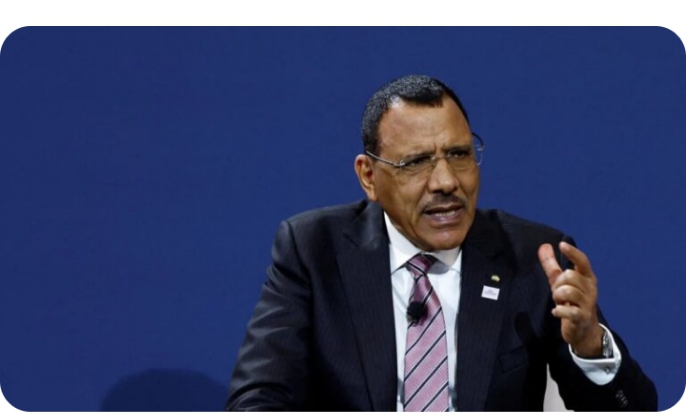Mohamed Bazoum, the ousted elected president of Niger, has revealed that he is currently isolated and being forced to consume dry rice and pasta by the military junta that ousted him and continues to hold power despite international pressure
Bazoum shared his plight through a series of text messages with a friend, disclosing that he had been devoid of any human contact since Friday and was lacking essential food and medicine supplies.
The messages from Bazoum, who agreed to their release, were made available to CNN.
Bazoum described his situation, explaining that he had endured a week without electricity, a condition affecting many Nigeriens.
Nigeria, which usually supplies much of Niger’s electricity, cut off the power in response to the coup.
The perishable food he had initially received had gone bad, leaving him with only dry pasta and rice for sustenance.
Despite his isolation, Bazoum managed to maintain contact with the outside world.
While he was denied the opportunity to meet with Acting US Deputy Secretary of State, Victoria Nuland, during her visit to the capital city of Niamey on Monday, he did manage to converse with her superior, Secretary of State, Antony Blinken, over the phone a day later, as confirmed by the State Department.
Ouhoumoudou Mahamadou, the prime minister under Bazoum’s government, reported to French TV that Bazoum’s spirits remained high, despite the dire circumstances he was in.
Although hopes for a diplomatic resolution to the political crisis are fading, Nuland’s meeting with key coup leaders on Monday involved extensive discussions that were described as “extremely frank and at times quite difficult.”
However, a planned face-to-face meeting between the junta and representatives from the United Nations and the Economic Community of West African States (ECOWAS) in Niamey on Tuesday was unexpectedly cancelled.
In a letter, junta leaders cited a “necessary” postponement of the meeting due to an “atmosphere of threatened aggression against Niger.”
Meanwhile, Mahamadou, Bazoum’s prime minister, expressed the junta’s desire to continue engaging in dialogue with ECOWAS, the regional bloc spearheading the response to Niger’s political turmoil.
ECOWAS leaders are set to convene in Nigeria on Thursday for discussions on the coup, though the exact agenda remains unclear.
While the regional bloc initially gave the junta a one-week deadline to return to their barracks and reinstate Bazoum, this deadline passed without any change occurring on Sunday.
ECOWAS maintains its preference for a diplomatic solution to the impasse, but it hasn’t ruled out the potential use of force to restore constitutional order and bring Bazoum’s government back to power.
On Monday, the Nigerien military deployed additional troops to the capital in preparation for a potential foreign intervention. This move was aimed at reassuring anxious residents, some of whom had either left the city or started stockpiling essential supplies.
The junta might now face organized internal opposition to its rule as well. Rhissa Ag Boula, a former rebel leader and minister in Bazoum’s government, announced the formation of an anti-junta resistance group called the Resistance Council for the Republic (CRR). This group is dedicated to reestablishing order in Niger.
The CRR urged the military to stand down and detain the junta’s apparent leader, Abdourahamane Tiani, and issued a warning that it would employ all necessary means to counter the troubling practice of challenging people’s choices by rogue and irresponsible soldiers.
Ag Boula’s movement could garner support among the Tuaregs, an ethnic minority in Niger. He had previously led Tuareg rebel factions in the 1990s and 2000s, fighting against the central government before being integrated into the political process by Bazoum’s predecessor.
Colonel Major Amadou Abradamane, a junta spokesperson, accused France of violating Niger’s airspace. The country had closed its airspace due to the threat of military intervention on Sunday.
According to Abradamane, an aircraft spent five hours in Nigerien airspace from 6:39 a.m., intentionally avoiding contact with Niger’s air traffic control. He alleged that the aircraft had taken off from Chad’s capital, N’Djamena.
